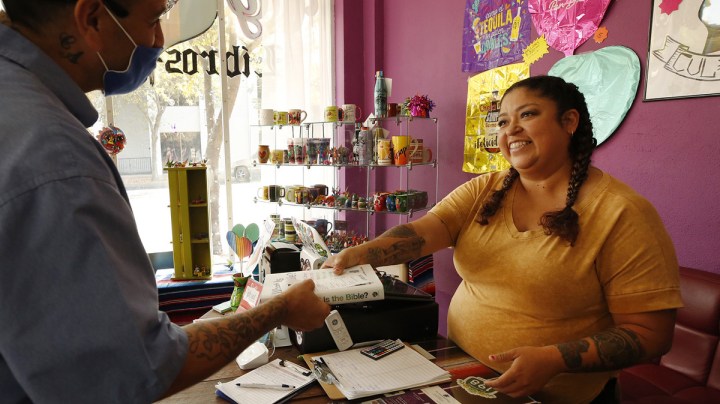Latino-Owned Businesses: Here’s the Truth Behind the 34% Decade-Long Growth

Janie Isidoro, owner of My Corazon, a Chicano business in downtown Hanford, CA helps Carlos Garcia, left. Al Seib / Los Angeles Times
The story of Latino-owned businesses is one that is familiar yet surprising. There is good news and there is bad news, and some of it is ugly and other parts are promising. This story is being told with the help of a 2020 research study by Stanford Latino Entrepreneurship Initiative out of the Graduate School of Stanford Business. The group started collecting information 5 years ago from 3,500 Latino-owned businesses. Last year they added 3,500 White-owned businesses to compare performance. The data helps tell the struggles of owning a business in an unpresented year for any business owner, let alone a minority one.
First, let’s talk about the good news. The 2020 State of Latino Entrepreneurship reports that businesses owned by Latinos have grown an astonishing 34% in the last decade. Compare that to the 1% (yes, 1%) for others. That makes LOB the fastest growing segment of the small businesses. What’s more is that growth is coming from various industries. Latinos own businesses of all kinds, however areas of non-service industry housed some impressive growth–finance and insurance was up 27%, transportation was up 25%, and real estate was up 22%.
Now, onto the not so good news. Despite Latino-owned businesses outperforming their non-Latino counterparts when it comes to revenue (25% vs. 19%), LOBs are still less likely to get a guaranteed loan from a national bank–and it’s not by a small margin either. In fact, they are 60% less likely to get approved for loan. This means that if a Latino-owned business is in need of a loan, they are more likely to get funding from places that put them at a greater financial risk. Business owners who are affected by this have had greater success with smaller community banks or crowd sourcing their funding.
The study was able to capture the financial effects on both Latino and White-owned businesses in 2020. 77% of Latino-owned businesses either profited or broke even in the last year, while 23% experienced a loss. Compare that to their white counterparts 85% who profited or broke even, while 15% experienced a loss.
Taking it one step further, Latinas fared worse than their male counterparts. Women business owners saw a greater impact on areas such as business closures, layoffs, and missed payments.
Overall, the study says Latino-owned businesses are growing and they are growing fast. However, they are forced to take risks with their business that others don’t have to.